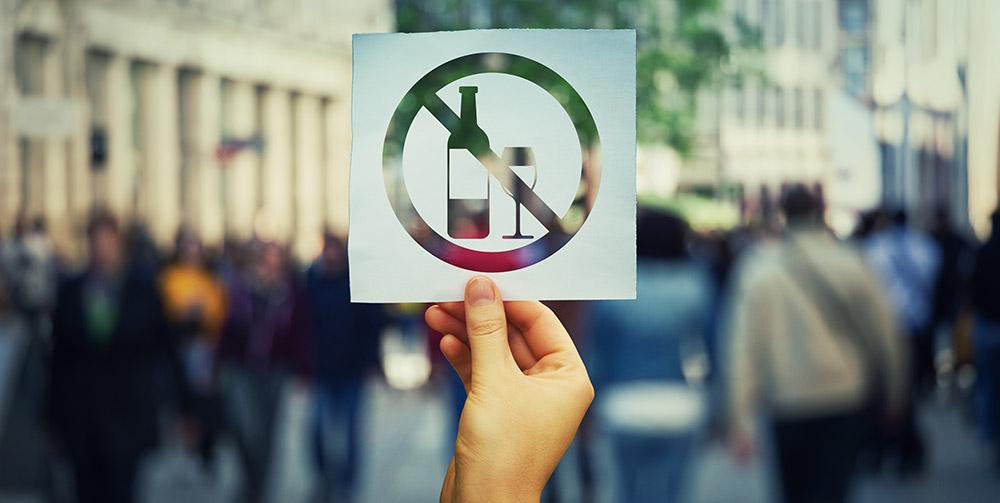Alcohol Addiction Treatment & Rehab
When alcohol addiction takes hold of your life, it can change relationships and compromise your future. Fortunately, understanding alcohol dependence and its treatment options will help you and your loved ones overcome the difficulties addictions can cause. We explore the importance of attending an alcohol rehab programme and what to expect from inpatient or outpatient treatment. Equip yourself with awareness and education and discover how to overcome alcohol addiction.
Understanding Alcohol Addiction
Alcohol addiction is also known as alcohol dependence, alcohol use disorder, or alcoholism. An alcohol use disorder is marked by an inability to control the amount of alcohol consumed or to quit drinking. Alcohol addiction is a medical condition that is diagnosed based on a clinical evaluation ( NIH).
Individuals who are dependent on alcohol may show signs of personality changes and behaviours to conceal their persistent drinking habits. Many who struggle with alcohol addiction are also in denial about their drinking patterns and claim to be able to stop when they want but are simply unable to.

Why Alcohol Addiction Treatment is Important
Seeking alcohol treatment is an important step towards a healthy and fulfilling life. The first steps including alcohol detox, support groups and therapy are the first steps towards sobriety, attaining your goals, and mending relationships.
Getting help for alcoholism can help you feel better. Alcohol is a depressant and contributes to intensified feelings of depression, anxiety, and inner turmoil. By pursuing treatment, you can stop the cycle of alcohol abuse and its psychological influences.
Drinking has a severe impact on the health of your liver, kidneys, and organs. While most are familiar with the intoxicating effects of alcohol, it can also cause rapid weight gain, changes in the condition of your skin, and a lack of energy. By quitting drinking, you can reverse many of the short-term damages caused by alcohol.
Life can get better when you stop drinking. It is up to you to make the change.
How Does Alcohol Rehab Work?
There are two ways to get help for alcohol addiction in the UK – residential programmes (inpatient treatment) or outpatient programmes.
Residential programmes offer the best chance of recovery success, since they take the individual away from the environment and allow them to focus on themselves in a safe and secure environment in our inpatient rehab facility.
The best time to enter an alcohol rehab programme is when you are ready. When you recognise the addiction and want to improve your life, you will work through an inpatient programme at a residential rehab facility. In the UK, all residential programmes are privately funded, which means you will have to pay for treatment yourself, or access funding by your local council. Some healthcare insurance providers such as AXA offer policies that cover addiction treatment.
Residential treatment programmes include detox & alcohol rehab (therapy) as part of treatment, in some cases of extreme alcohol dependency, a medically-assisted alcohol detox will be provided by our treatment providers to help reduce withdrawal symptoms.
The first brave step towards recovery is detox. With the help of a professional and certified medical practitioner, you can successfully complete detox from alcohol.
The next stage is to receive treatment for withdrawal symptoms and supportive therapy. During alcohol rehab, you will remain at the facility for the duration of the programme and meet with a therapist, engage in enriching activities throughout the day to help your physical and mental health issues, and learn important coping strategies to prepare for sober integration into your home and your community.
Along with detox and therapy, individuals overcoming an alcohol addiction in our alcohol rehab clinic will receive valuable aftercare and immense support outside of the inpatient treatment centre.
1. Medical Assessment
Prior to entering into a rehabilitation programme for alcohol rehab, a complete medical assessment is performed. The free addiction assessment consists of a physical evaluation and a screening tool conducted by a professional medical doctor. The purpose of the exam is to determine alcohol use over time, the presence of a suspected addiction, and any pre-existing health conditions ( NCBI) or mental health issues. This ensures that individualised support programmes are created for safe alcohol detox and client care.
Prior to entering a rehabilitation centre for treating alcohol misuse, a professional medical assessment must be completed. This includes the clarification of the frequency, the duration, and the nature of substance abuse patterns. During this free confidential assessment, a practitioner can learn whether co-morbid conditions or multi-use substance dependence is present. The use of multiple substances such as alcohol and prescription medication can complicate the treatment plan and requires a tailored approach for detox and withdrawal management of both substances.
2. Detox
The process of alcohol detox is a necessary step towards sobriety during your alcohol rehab. While many are apprehensive about detoxing from alcohol, with the support of loved ones and experienced rehabilitation staff, symptoms are managed and client safety prioritised.
Detox from alcohol is best completed under the supervision of a GP at home or in an inpatient centre. During a detox, alcohol is metabolised and cleared from the body following a safe and professionally supported process.
The Industrial Psychiatry Journal concludes that detoxing from alcohol starts 6 hours after your last drink, and withdrawal symptoms 24 to 48 hours thereafter.
Hallucinations, fatigue, nausea, and dizziness are common withdrawal symptoms that are eased and managed in a professional inpatient and clinical setting.
3. Rehabilitative Therapy
A necessary part of your journey to recovery from alcoholism is to receive rehabilitative therapy. Rehabilitative therapy consists of individual and group counselling. It is led by an addiction specialist and focuses on the underlying reasons for persistent and uncontrolled use of alcohol.
Current Addiction Reports reveal that an average of 48% of patients with severe alcohol consumption problem have experienced a lifetime of social anxiety and depressive symptoms. For adolescents, there is a strong connection between alcohol use and dependence attributed to vulnerabilities and peer pressure.
Alcohol rehab is where you learn how to address the addiction and uncover deep-rooted issues that maintain dependence. It helps to identify and control the social, environmental, and personal triggers responsible for cravings and the risk of relapse.
To curb alcohol dependence requires overcoming the psychological traumas and learned behaviours that make it hard for individuals to overcome alcohol dependence. Therapies including Cognitive Behavioural Therapy (CBT) introduce coping skills and challenge thought patterns and behaviours maintaining addictive habits. Dialectical Behavioural Therapy (DBT) is a popular therapy for clients who present with multiple substance dependence or personality disorders. The goal of therapy is to identify the thought processes, behaviours, perceptions, and presence of psychological disorders associated with alcohol addiction.
Amongst the several types of therapy sessions we offer, group therapy, cognitive behavioural therapy and family therapy are the most popular in our inpatient treatment options to help mental health.
Enter your phone number below and one of our qualified addiction specialists will get in touch to discuss your options.

Aftercare & Support
Aftercare and family support are provided through a private rehab programme. Clients can receive ongoing support groups free of charge up to a year after completing the initial residential rehabilitation. Free outpatient services do exist for those seeking cheaper alternatives, including support groups such as Alcoholics Anonymous (AA).
Outpatient Services
When you seek alcohol addiction treatment, you can choose between residential and an outpatient programme. A closer look at the different services including free programmes and private addiction counselling can help you on your path to sobriety.
Outpatient Rehab Programme
Outpatient services provide the flexibility to attend work and remain connected to friends and family while receiving medical treatment. Examples of outpatient programmes include services offered by the NHS, Alcoholics Anonymous (AA) meetings, and attending addiction counselling by a qualified therapist. Individuals struggling with an addiction can attend a day rehab that provides the structure and support of an inpatient programme but without staying at the facility for the duration of therapy. Clients attend meetings and counselling for a few hours daily.
For those with a severe alcohol addiction, an inpatient programme, followed by aftercare provides immense emotional, physical, and recovery support. If you experience withdrawal symptoms, we can provide a quicker response in our treatment facility.

Choosing an Alcohol Treatment Centre
The task of choosing an alcohol treatment centre can feel overwhelming. The first step is to learn about the services provided by each type of rehab programme offered in your location. A simple way to compare ratings and to learn of the therapies offered through specific centres is to visit the CQC. Treatment centres are regulated by the CQC and each facility has its own set of ratings.
The next stage is to determine the therapeutic models used by the treatment centre. A traditional 12 step model consistently provides the tools, coping skills, and success rates for those struggling with alcohol addiction. It encourages forming a spiritual foundation or recognizing a higher power to overcoming dependence.
The non-traditional model encourages self-empowerment and education. It is also a preferred method of treatment for those affected by multiple substance-use addictions or a dual-diagnosis.
If you need professional guidance on the best rehabilitation programmes and centres in your region, do not hesitate to contact us. Our professional and supportive consultants are here to help you find the right treatment centre for your needs.
Secondary Treatment
Secondary treatment is the process of transitioning from primary care (attendance of an inpatient or structured programme) to applying learned skills and adaptive coping strategies in a real-world setting. The programme runs from 1 to 6 months and provides support for those learning to live without a substance while they continue to explore psychological and emotional reasons for addiction with a therapist.
Paying for Alcohol Addiction Treatment
Depending on the programme chosen for your alcohol rehab, some facilities will accept a deposit with installments made until payment is settled in full.
There are some private insurance providers that do cover addiction treatment.
Before Attending Alcohol Rehab
For the most successful outcomes, making the commitment to alcohol rehab and understand what is required of you can help you along your journey to sobriety.
Below are some questions you need to think about before committing to treatment.
Make sure you are committed to treatment
It is important to want to change and to want to seek treatment for your drinking problem. Commitment is the key to effective and lasting change to help you overcoming alcoholism.
What to bring to the treatment centre
When entering our residential treatment centre, any alcohol-based products are prohibited. Any chronic medication must be sealed, and no consumables or weapons are allowed onto the site. In some programmes, mobile devices are not allowed.
Remove alcohol-related products from the home
To assure loved ones of the best possible chance at recovery and reduce their alcohol cravings, families, and friends are encouraged to remove any alcohol-related product from the home. This prevents unnecessary exposure and temptation to drink alcohol, and it will help tremendously their alcohol problems.
Talk to the treatment centre if your circumstances have changed
If someone with alcohol addiction is using other types of drugs, whether illicit or prescribed, it is important that this is communicated to the rehab centre. This increases awareness of the substances involved and allows staff to adjust medication and support during an alcohol detox for safety purposes.
Have a Plan
Prior to leaving treatment, be sure to have a plan in place. Whether this involves the attendance of therapy or focusing on your career, a plan will keep you busy and reduce the potential for relapse.
Research Support Groups
One of the best ways to maintain your sobriety is to seek the assistance of a support group. Sharing with like-minded persons and attending meetings can help you share experiences, emotions, and need for therapy. Alcoholics Anonymous and SMART Recovery are programmes offering group counselling.
UK-Wide Addiction Treatment & Support
We handpick the best treatment facilities and professionals so you receive the most suitable treatment, tailored to your needs and requirements. Call us now at 03334444432 for 24/7 support.
Consideration for treatment is achieved with love, friend and family support, and encouragement. If you are concerned about someone you care for, speak to them about how their choices are affecting their family, their career, finances, and health. All you can do is encourage therapy.
Yes, both residential & outpatient rehab services are confidential. Take some time to choose a trusted facility to maintain your privacy. With regulations in place, you can rest assured that the appropriate standards of confidentiality are maintained.
